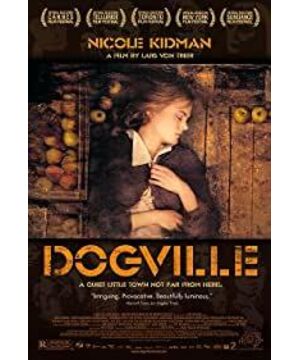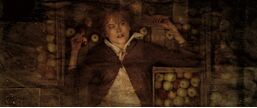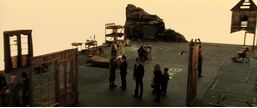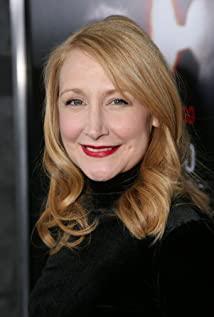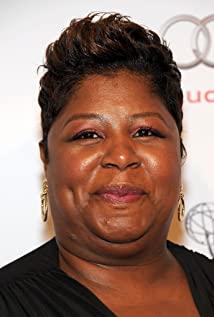There used to be an article circulating on the Internet, forgetting the title, only remembering that the content was an experiment on a group of monkeys to simulate the origin, loss and reconstruction of human morality, class, belief, superstition, etc. When reading this article, smiling from time to time, standing outside of morality, wandering between good and evil, then everything is just pastime. No matter how deep the monkey is, it is just a monkey.
Obviously, the director of "Dogtown", Lars von Trier, did not provide us with another story that can be detached from the outside. He still adheres to the "Breaking the Waves" and "Dancers in the Darkness" directed by him. The usual preaching face tells the story of an American Peach Blossom Land so cruel.
The story is set in a small town in the canyon of the Rocky Mountains in the United States in the 1930s-Dogville. This is a harmonious and ordinary American town, living in this group of poor but kind-hearted people, they have faith—the young literary youth Tom serves as their pastor, and they have a democratic system—the town residents are in the church Voting is a microcosm of the United States. This is the first film of "American Trilogy" directed by Lars von Trier. It still follows the rules of "doama95". There are no asynchronous music and sound effects, no lighting effects, and only shaking with a handheld camera. While shooting, all the scenes are on the stage of a drama, and all the houses, trees, and even dogs are just outlined on the floor with chalk—the director hints us so bluntly that this is a metaphorical story.
The heroine Grace broke into this originally quiet town in order to escape the chase of the underworld. After the gunshots, she met Tom. Tom is a literary youth who possesses the characteristics of all literary youth-weakness, self-proclaimed noble, ideal and impractical. He always loves to stand on the moral clouds, overlooking the people in this town. Yes, he helped Grace avoid the underworld; yes, he was also at the church persuading the people in the small town to give Grace two weeks to decide whether to keep her. From this point of view, he is really a noble morality. kind person. Yes, in Grace’s opinion, which of the people in this small town is not kind and simple, the blind old man who still praises it in the most poetic language even though he can’t see the world, the farmer who has worked hard to manage his apple orchard With his wife who gave birth to seven children, the single and busy truck driver, the young man who had a low IQ but worked hard to learn engineering skills, the Tom’s father, the lovely country doctor who always suspected that he was terminally ill, ..., all the people, all the people living on both sides of this elm street, they do not have the indifference and selfishness of people in big cities, they are so enthusiastic and kind, conservative and democratic—especially when they were caught in those two weeks. Lace was touched by her enthusiasm and diligence, and after voting to let her stay. Just as Van Loon said: "Most Romans’ lives in dire straits have a lot to do with the success of the earliest missionaries, just as hardship leads to theological success." This poor town can be seen as an adherence to Christianity. The paradise of faith.
Grace is a perfect Christian portrayed by the director, fraternity, tolerance, and moral supremacy. What she escapes is the evil life endowed by the family. She even feels guilty for stealing the flesh and bones of the dog. Suffering from suffering, she tolerates people who have hurt her, just as her father, the underworld boss said, she always set her own moral standards very high and others set very low. For Grace, this small town is just a dream garden of material poverty and spiritual abundance. It is the honey and milk Canaan that God has promised his lambs. The image of sheep has always been meek and kind, but if it is hungry and thirsty, the flock will bite the belly of the weakest sheep, suck its blood and eat its meat together... Just as the voice-over at the beginning of the film said that the only street in the town, Elm Road, "is a dark and deep tunnel at the end", is the depravity of human nature darker and deeper than that tunnel?
Grace stayed in this small town at the price of helping every family in the town, and lived every day happily and happily. The people in the town were also very kind and willing to help her. Until one day, the police posted a tracing revelation with a large bounty. The people in the small town began to hesitate, because the price of taking in Grace began to increase. Although everyone agreed to continue to take Grace under Tom’s persuasion, the price was that Grace’s workload would increase. The hard work and the gradually indifferent attitude of the people in the town, Grace endured all this and began to fall in love with Tom. Grace began to save money to buy the seven ceramic villains in the small-town grocery store. These seven villains represent the seven deadly sins of human nature—gluttony, greed, laziness, lust, arrogance, jealousy, and rage— Enclosed in gorgeous ceramics, the brilliance of humanity is as smooth as ceramics.
I remember once reading a pornographic novel adapted from "Snow White", which said that after the seven dwarfs rescued the princess, they were unable to bear their inner desires and insulted Snow White. Snow White wakes up and sees her prince—then this is a beautiful fairy tale; if she opens her eyes and sees seven ugly and sensual faces—then this is reality. When the police and the FBI came to the town again and posted that Grace was a wanted robber, our Snow White Grace finally opened her eyes and saw the hideous faces of the entire town.
Everyone in the small town knows that during the time when the so-called robbers were on the wanted order, Grace worked diligently to help every family in the small town, so Grace was not a robber. However, people began to become more and more indifferent and repulsive of Grace. They ruthlessly sent Grace to her and couldn't tolerate any small mistakes made by her. In the eyes of people, Grace was no longer a beautiful angel, but admired their favor. The weak. Does the system give people the right to oppress the weak, or is it because the evil of human nature gives them the courage to expose their nature? As Grace said, kindness is relative. At this time, Grace began to understand that people here, like people everywhere, will not be more determined to pursue beliefs and morals because of material scarcity. Any kind of virtue of helping others and being kind to others, if the price is too high. People began to hesitate, became aggrieved, and were not so willing. People feel that the beneficiaries must be rewarded, and the beneficiaries themselves must have a lower morality. Such a moral commanding height also constitutes the psychological basis for them to enslave Grace.
The rude and vulgar apple orchard farmer threatened to betray Grace to the police and raped Grace; his son threatened to frame Grace against his mother, hoping to get Grace's approach. The farmer’s wife who thinks Grace seduced her honest and upright husband led the women into Grace’s cabin, bullied her, and smashed her seven villains in front of Grace: "If you could If you can't help crying, I will leave you one or two..." The sins of human nature spread with the shards of ceramics.
Tom began to help Grace escape, but in the escaped car, the happy bachelor truck driver raped Grace-"For riskier cargo, we generally charge extra insurance costs." But when Grace woke up in the bumpy car, she found that she was back in the small town. In order to remove the suspicion of stealing his father’s money, Tom revealed his escape plan that night and blamed it on the crime of stealing money. Grace. At first, people were afraid of Grace’s staying, but now they refuse to let her leave. People have become accustomed to enslaving and bullying her. They have become accustomed to the existence of a lower-level person to highlight the meaning and significance of their existence. Morally superior. Just like the grief and indignation in "Zhuangzi": "There is no close punishment for evil." If you do evil without being punished, then who doesn't like "You can save your life, you can live your life, you can support your relatives, and you can endure for years."
People regarded her as a thief, a fugitive, a lowly moral and licentious woman. They designed a chain around Grace's neck, making her move difficult and unable to escape. Now every woman in this town can bully her, every child can throw stones at her and spit, every man can defile Grace's body-except Tom. Tom watched his father come out contentedly from Grace’s room, but he seemed to be lost in thought. The man who claimed to love Grace and wanted to help her, just paced cowardly outside the window, watching everyone in the town. The individual bullied her and regarded it as a slut, but she was pretending to be painful and thinking. Just like the Mary mentioned by Duke Meshkin in the novel "Idiot", everyone in the village has a sense of moral superiority, despising her and ruining her, completely forgetting what their savior said: "Who among you is innocent? , Whoever can stone him first.” We always love to put moral chains on those who we think are morally stained, bully them with gossip, put all sins on their heads, and watch them. A joke, as if this is the way to reflect one's moral superiority. The more sinful people are, the more intolerant they are, because they fear in their hearts that they are sinful, and only if they are intolerant of the sins of others can they think that they can get the moral superiority of doubts. I also left a girl in such a sinful town, and I was as weak, hypocritical and impractical as Tom, letting her wither in people’s chains but failed to help, if this world was true With God, I don’t want God to forgive my sins. I would rather be punished with the same pain and be bullied and discriminated against by people as they please to repay what I owe--however, what I lost can never be compensated. . If morality is only a kind of experience accumulation and deduction of human social interaction, then it must be built on the basis of gains and losses. We take it for granted that we face the weak who are favored and have no ability to cause harm to themselves. Putting their morals on the mark of humbleness, then enslaving and taking the weak has become a kind of "morality" itself! If morality is a transcendental norm, extremely sacred and naturally correct, then who can show me where in this world can highlight the glory of God!
Tom finally decided to end this painful situation. He once again called everyone in the church to make Grace want everyone to state clearly and explain the sins during this period of time. However, everyone's reaction was-"It's impossible, it's completely different from what I had in mind." People lie openly, everyone is a part of sin, everyone is lying, so the lie becomes the truth, and the sin has never happened. Although those sins are like the clear and deep marks that Grace dragged through the snow. This angered Tom, who was morally superior, and he scolded the residents of the town for this "rude reaction", and then he was desperate. He felt that he had paid a lot for the love he was doing, so he also began to ask for it-he asked to have sex with Grace, just like other men in the town.
Without freedom, Tom climbed onto Grace's indifferent body, ready to do the same things as other men. However, Grace said she didn't love him anymore, and Grace saw his face clearly. He, like other men, only wanted to possess her, but he was more hypocritical and cowardly. Tom suddenly climbed off Grace and walked out of Grace's cabin. Tom was annoyed-not because Grace had insulted his emotions, on the contrary, because Grace was right. This fact makes this philosopher who has been standing on the moral sky painful, so he decides to betray Grace-if the victims who have experienced our sins no longer exist, then the sins have never happened, people in the sun. Still so simple and kind. We can always find such cases easily in human history, such as the persecution of pagans by the Christian Church, the Nanjing Massacre in Japan, the Cultural Revolution of the Chinese,....
When the underworld convoy came with live ammunition, Tom also asked them for the whistleblower compensation on behalf of everyone. As we know, director Lars von Trier is a devout Christian. Judging from his usual style, this film is still his preaching speaker; as a traditional European, we fully understand He hates and despises the United States, but admires him in his heart. The director finally designed the ending of the massacre. Everyone fell under the gun—including the Tom who used writing as an excuse to escape punishment. All the houses were burned out by the fire—just put the Just wipe off the chalk outline, all the sins, American blasphemy and material worship, were symbolically destroyed in the fire-just like the cities of Sodom and Gomorrah recorded in the Bible. "If you destroy a small town and the world will get better, then it is destroying this town." Grace who once "slapped the left cheek and turned the right cheek" finally disappeared, Christian's God suddenly changed from the "New Testament" to the "Old Testament", the vengeful and cruel God. What devout Christians like to discuss is that the kingdom of heaven will drop a big ball of fire and burn out this sinful world, just as it was practiced in the city of Rome-although this crime was later successfully accused of the unlucky emperor Nero On the head. Grace finally said coolly: "There are many children in the family here. Kill her children in front of the mother and tell her if she can hold back crying, then leave her one or two. "When the Mafia members fired at the infant who was still in their infancy--the wife of the apple orchard farmer who had personally smashed Grace’s seven pottery figures, finally saw the loss of her seven children--I I can't help but think of the video of Iraqi terrorists beheading Americans. So all the merits were fulfilled, the director finished his speech, and the audience was relieved.
But - wait a minute, why can the devout Christian director stand on the other side of good and evil, stand on the cloud of morality, and criticize Americans? Each of us may be the poetic and optimistic old man, the honest apple orchard farmer and the kind and kind wife, the humorous and intelligent town doctor, the carefree bachelor truck driver, the naive The innocent child may be the kind and honest, thinking and literary moral young Tom,..., we may even be the Grace who has been bullied and still bears tolerance silently, whether we are devout Christians or firm Atheists, in the face of this judgment about human nature, each of us is a resident of a small town, sometimes we are the abuser, and sometimes we are the abuser. So who can pick up the stone with confidence and smash it at others? This is not the whole question. The core question is, why does Grace finally eliminate sin by relying on the power of sin? Although as her father said: "Humans are different from dogs. Dogs can be educated, but humans are not. Scum should be eliminated." So this powerful crime and this barbaric violence also resisted. The banner of walking ran to the other side of good and evil, holding the tone of God and began to speak. Yes, human nature is evil, as Nietzsche said, man is a rope hanging between the two cliffs of beast and superman. But the mortal who wants to be a superman, who wants to use his power to eliminate evil, often falls into the abyss.
It is said that human beings are willing to be upright by nature, but they are often fearful, and because of fear, they become unrighteous; human nature is willing to do good, but the desire to do good is often frustrated, so they choose to do evil. We see the sins in the world, and all we can do is to keep ourselves from sins. In the dark room, the eyes of the gods are like electricity. Only by increasing the risk and cost of evil can there be moral protection.
If I were to design an ending, I would definitely not be so religious. I would add four feet at the end of this film: At the end Grace wakes up and finds that the massacre is just a dream. She does not have the father of the Mafia godfather, and that With the chain still around her neck, Tom raped her like other men, and she gradually became accustomed to that kind of life, and took it as usual, even afraid to leave that environment-because as soon as she left that environment , She will find that the suffering she has suffered is so unbearable and disgusting, her choices and judgments were so wrong and make herself regret, this will be a burden she cannot get rid of-so she still Staying in that small town, still getting used to the role of the abuser and beginning to learn to enjoy it, waiting for a new angel to enter, maybe by then she can also play the role of the abuser. What a harmonious town~~~ (how to talk about sadism and masochism, who said I’m not trendy)
Please forgive me for the last arrogance, quoting the sentence in the "Bible": "The existing things, There will be later. What has been done will be done again. There is nothing new under the sun."
View more about Dogville reviews


